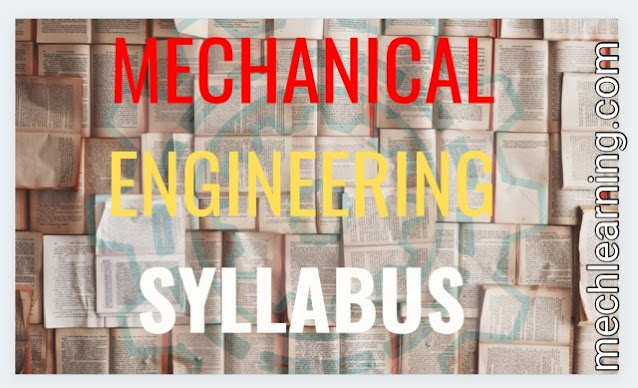Que. I want to know syllabus of all subjects in Mechanical Engineering 1st year?
Answer for above question is as follows,
Each semester consists of different types of subjects. Each semester having 6 months time period.
 |
| 1st year syllabus of mechanical engineering |
First (1st) year Mechanical Engineering syllabus as follows:-
First semester (1st) syllabus for mechanical engineering:-
1. Basic Mechanical Engineering (BME)
2. Engineering mathematics-I (M-1)
3. Basic Electrical Engineering (BEE)
4. Engineering Chemistry (EC)
5. Applied Mechanics (AMS)
Labs:-
1. Communication Skill - I
2. Lab I : Workshop Practice
3. Lab II : Basic Mechanical
Engineering
4. Lab III : Basic Electrical Engineering
5. Lab IV : Engineering Chemistry (Group B)
Second (2nd) semester syllabus for mechanical engineering:-
1. Engineering Mathematics-II (M-2)
2. Engineering Physics
3. Basic Civil Engineering
4. Engineering Graphics
5. Basic Electronics and Computer
Programming
Labs:-
1. Communication Skill - II
2. Lab I : Engineering
Physics(Group B)
3. Lab II : Basic Civil Engineering
4. Lab III : Engineering Graphics
5. Lab IV : Basic Electronics
6. Lab V : Computer Programming
Detailed syllabus for first (1st) semester of Mechanical Engineering:-
1. Basic mechanical engineering ( BME)
SECTION-I
Unit 1: Thermodynamics system.
Unit 2: Gas Laws & Gas Processes
Unit 3: Pumps, Compressors & Turbines.
Unit 4: Power Plants in mechanical Engineering.
SECTION-II
Unit 5 : Internal Combustion Engines.
Unit 6: Power Transmission System.
Unit 7: Mechanical Engineering Design.
Unit 8: Introduction to Machine Tools & Joining Processes.
2. Engineering mathematics-I (M-1)
SECTION I
Unit 1: Successive differentiations.
Unit 2: Expansion of the functions.
Unit 3: Complex Numbers.
Unit 4: Hyperbolic Functions.
SECTION II
Unit 5: Matrices-I
Unit 6: Matrices-II
Unit 7: Partial differentiation.
Unit 8: Applications of partial differentiation.
3. Basic Electrical Engineering (BEE)
Section-I
Unit 1: D.C. Circuits.
Unit 2 : Work, Power and Energy.
Unit 3: magnetic circuits.
Unit 4: Alternating current (A.C. ) fundamentals
Section- II
Unit 5 : Single Phase A.C. circuits.
Unit 6: single phase transformer.
Unit 7: polyphase circuits.
Unit 8 : electrical drives.
4. Engineering Chemistry (EC)
Section I
Unit 1 : Phase rules.
Unit 2 : water and it's properties.
Unit 3 : corrosion and its preventions.
Unit 4 : lubrications
Section II
Unit 5. Fuels
Unit 6. Engineering materials.
Unit 7. Chemistry of polymers.
Unit 8. Chemist of analytics.
5. Applied Mechanics (AMS)
Section I - Kinematics
Unit 1. Resultant of coplanar forces.
Unit 2. Equilibrium of bodies.
Unit 3. Support reactions.
Unit 4. Analysis of pin joints frames.
Unit 5. Centre of gravity (CG) and moment of inertia (MI)
Section II - Dynamics
Unit 6. Kinematics of particles - linear motions.
Unit 7. Kinematics of Particles - Curvilinear motion.
Unit 8. Kinetics of Particles.
Unit 9. Work energy and power.
Detailed syllabus for second (2st) semester of Mechanical Engineering:-
1. Engineering Mathematics-II (M-2)
Section I
Unit 1. Ordinary Differential Equations of the first order & first degrees.
Unit 2. Numerical solutions of the ordinary differential equation of first order and first
degrees.
Unit 3. Applications of differential equations.
Unit 4. Numerical Differentiations.
Section II
Unit 5. Integral Calculus.
Unit 6. Curve tracings.
Unit 7. Multiple integrals.
Unit 8. Applications of multiple integrations.
2. Engineering Physics
Section I
Unit 1. Band Theory's and Semiconductors.
Unit 2. Crystallography.
Unit 3. Acoustics & Ultrasonics.
Unit 4. Relativity Theory's.
Section II
Unit 5. Diffraction & Polarizations.
Unit 6. Fiber optics in physics.
Unit 7. LASER.
Unit 8. Nuclear Physics and Basic concepts of Nano Materials.
3. Basic Civil Engineering
Section I
Unit 1. Introduction to Civil Engineering.
Unit 2. Water managements.
Unit 3. Surveying.
Unit 4. Transportation Engineering.
Section II
Unit 5. Components of a Buildings.
Unit 6. Building materials.
Unit 7. Building plannings.
Unit 8. Advances in Civil Engineerings.
4. Engineering Graphics.
Section I
Unit 1. Engineering course.
Unit 2. Projection of the lines.
Unit 3. Projection of solids.
Unit 4. Orthogonal projections.
Section II
Unit 5. Isometric views.
Unit 6. Section of solids.
Unit 7. Prospective projections.
Unit 8. Development of lateral surfaces.
5. Basic Electronics and Computer
Programming
1. Basic electronics:-
Unit 1. Introduction to Electronic Components
Unit 2. Semiconductors and p-n junctions.
Unit 3. Electrical transducers.
Unit 4. Digital electronics.
2. Computer programming:-
Unit 1. Fundamental of computers.
Unit 2. Programming controls.
Unit 3. Array and Strings.
Unit 4. Basic of pointers.
Here we concluding, If you have any queries about of I want to know syllabus of all subjects in Mechanical Engineering 1st year then feel free to comment below.
Related articles:






0 comments:
If you have any doubt, please let me know